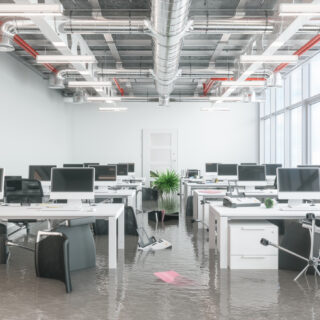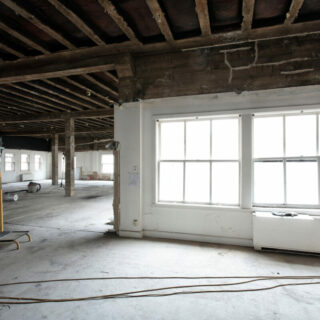Water Damage: What You Need to Know

What Is the Biggest Concern with Water Damage?
Very few issues are as harmful to a building as water damage. Whether caused by a flood, a burst pipe, a backed-up sewer drain, or any other issue, water damage is an emergency that must be addressed at once. Failure to perform commercial water damage remediation in a timely manner can lead to other serious issues such as the development of mold.
What Is the Biggest Concern with Water Damage?
If left untreated, water damage can place your employees and customers at risk of serious health issues. For this reason, commercial water damage restoration should always be performed promptly after you experience an incident.
Some of the biggest concerns associated with water damage include:
- Toxic mold growth – Mold growth is by far one of the most common issues associated with water damage. Mold could begin to grow as quickly as 1-5 days after water damage. Some types of mold can be toxic and increase your risk of health issues, including respiratory disorders, making the removal of any mold a high priority.
- Structural damage to your property – Water can penetrate the structure of the building, damaging the foundation, walls, floors, ceilings and contents inside the building.
- Health risks – Category 3 water damage (from contaminated water) can result in severe health risks for anyone who inhabits the building. It can lead to headaches, problems with your immune system, and other diseases. Even clean water, left untreated, can evolve into category 3 water damage in approximately 72 hours, posing similar risks.
- Pest infestation – It’s common for buildings to experience pest infestation after water damage. Cockroaches, carpenter ants, silverfish, drain flies, and beetles all prefer moist environments and flock to a water damaged building.
- Electric shock – Water damaged wiring can make your building prone to electric shock, sparks, and other electrical injuries. For this reason, it’s critical to thoroughly evaluate your electrical system, including all wires and outlets, after water damage.
What Is Water Damage Insurance?
Water damage insurance is often offered as part of your insurance policy for your commercial property. It provides important protections against sudden and accidental water damage, but typically doesn’t cover issues associated with negligence, flooding, or a failure to properly maintain the building.
Sudden and accidental water damage refers to issues associated with flooding or overflowing water caused by a problem with your plumbing system, HVAC system, or appliances. It may also cover damage associated with a water backup from clogged sewage lines, drain lines, or sump pumps.
Water damage insurance is an important coverage that you should always opt for whenever it is offered for your commercial property, as it can provide significant financial relief in the event that expensive commercial water damage cleanup and repair is needed.
How to Deal with Commercial Water Damage
There are several critical steps that must be taken to contain and repair damage to your commercial property after sustaining water damage:
- Identify the source of the water damage – Identifying the source of the water damage can often help you contain the problem quickly. Common causes include burst pipes, leaks in your roof, and other plumbing issues such as a backed-up toilet or sewage drain.
- Shut off the water main (if necessary) – If your water damage is caused by a leaking or burst pipe, shut off the water main to prevent additional water from flowing into the property and causing more extensive damage.
- Contact a commercial water damage restoration team – Due to the extensive problems caused by water damage, it must be handled by professionals. Working with a commercial water damage restoration team will ensure the process is handled correctly and any potential mold remediation services are performed in a timely manner to prevent serious health issues from developing.
- Contact your insurance company – If you have water damage insurance, you may be able to file a claim with your insurance company to recoup the costs of commercial water damage restoration. Make sure to document the damage by taking photos of the impacted area.






